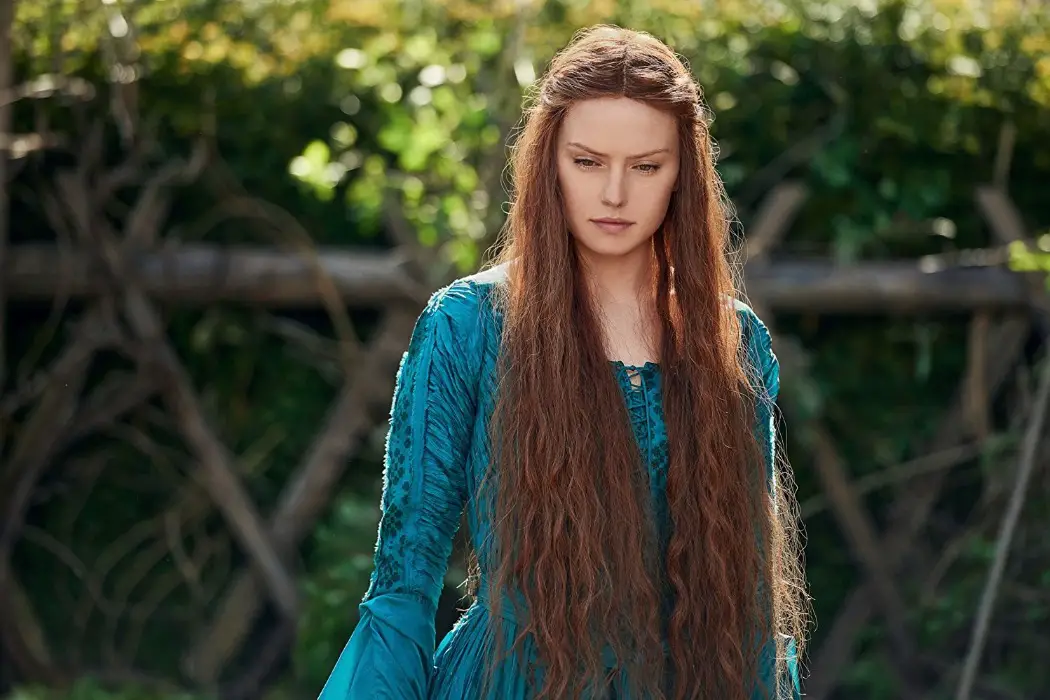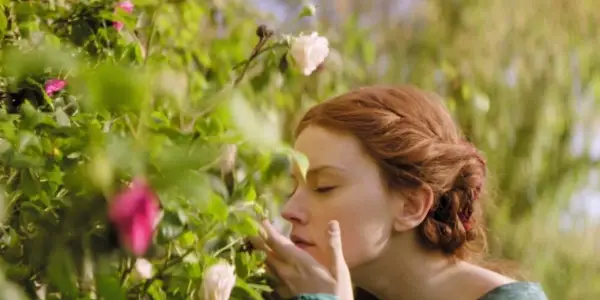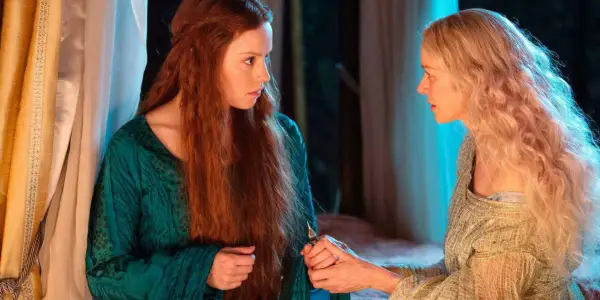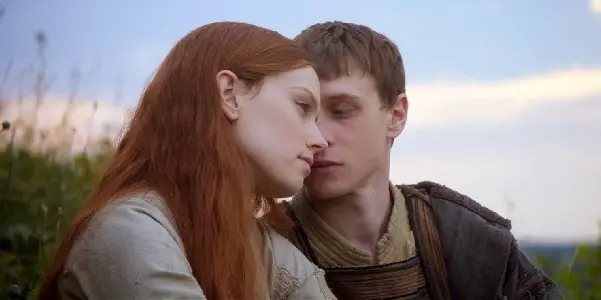OPHELIA: A Beautiful But Uninspiring Re-Imagining

Amyana Bartley is a screenwriter and producer. Her company, Queen…
Ophelia has been a long-studied character seen as a metaphor for femininity and a lack of equality. Her innocence is broken by her tortured love for the character Hamlet. In his descent into the madness of treachery, murder and dealing with ghosts, he abuses Ophelia, kills her father Polonius and drives her to madness and, eventually, her ultimate demise.
The film Ophelia, starring Daisy Ridley in the title role and directed by Claire McCarthy, is adapted from the book of the same name by Lisa Klein. It shows us a re-imagining of the Shakespeare classic from the perspective of Ophelia, with a few new surprises and a feminist twist.
“Where is the Beauteous Majesty of Denmark?”
The film begins with Ophelia as a young girl growing up motherless in the court of Hamlet’s (George MacKay) father the King and mother Queen Gertrude (Naomi Watts). The King looks to be portrayed by Nathaniel Parker of Franco Zeffirelli‘s Hamlet fame, though he is not credited, nor is the character mentioned in the credits. Ophelia is portrayed as a bright, strong young woman, vastly different from the shy, obedient character in Shakespeare’s play, though not too far-fetched for the time period.

Later, Hamlet returns from being away at school to find a beautiful young woman that he inevitably falls for. Though Ophelia likes his attention, she is not immediately impressed. As he pursues her, we get to see a desirous, lusty side of their relationship not explored before in the play. Though MacKay seems an odd choice to play the tormented Prince, he and Ridley share a good chemistry that makes their relationship believable.
Hamlet’s uncle Claudius (Clive Owen), portrayed in the silliest wig since the one donned by Javier Bardem in No Country For Old Men, plots to change Hamlet and Ophelia’s world forever, by murderously scheming for the throne and Queen for himself. Though quite unsubtle in his yearnings for power, his drive for Gertrude seems forced and dishonest. Watts and Owen have very little chemistry between them, which is strange considering I’ve seen Owen deliver passionate rapaciousness and downright lechery in multiple films in his past. After all, if Gertrude is to agree to the murder of her husband for his own brother, it would need to feel worth it.
“How should I your True Love know?”
Just before Ophelia and Hamlet’s love can begin, he goes back to school. During this time, his father is slain and Gertrude is remarried to Claudius. When Hamlet hears, he comes back in time to interrupt the wedding, but at this point, must yield to the new King. Here the film takes a twist on the usual play and moves the story forward, propelling all of the actions based on the relationship between Ophelia and Hamlet, and her interactions with the characters of court.
When in the play we would’ve seen Hamlet confronted by his father’s ghost, we instead see Ophelia and Hamlet’s secret marriage; Ophelia trying to save Hamlet from impetuous actions based on his grief and her attempts to right the wrongs inflicted by Claudius. In this sense, the story is Ophelia driven.

We also see the story wander to a relatively needless side story involving Gertrude and a supposed “witch” in the forest. Gertrude obsesses with staying young and her way of doing so is by drinking tonics made by this supposed “witch”. The witch ends up becoming a twist of her own, but it wasn’t really necessary to the overall plot.
It could be that the book had a richer background/storyline for this character, but the film doesn’t handle it well. Even though a potion the witch creates finds itself useful to Ophelia, there are a hundred other ways the needed potion could’ve gotten into Ophelia’s hands. The film makes the witch’s character veritably useless and therefore, renders the side story as such.
“Could Beauty have better commerce than with Honesty?”
The star of Ophelia is, by far, the cinematography. Cinematographer Denson Baker takes his craft to another level. The cinematography is the world of this film and it rescues the film from anything it lacks in acting or storyline. From luscious panoramas to the gorgeous dragonflies and lily pads of Ophelia’s favorite pond, we are willingly sucked into Ophelia’s beautiful province.
Filmed in historical locations of Prague, the Czech Republic and studio sound stages, Ophelia’s masterful crew built cinematic perfection of a fictional 14th century. Most impressive is the “building” of Elsinore Castle, where much of the action takes place. Production Designer Dave Warren patched together different aspects of many real castles of the Czech Republic to create Elsinore Castle, which turns out to look effortlessly realistic.

The production design, mixed with Baker‘s cinematography, captures a dazzling, delicate vision of a (most likely) filthy, brutal medieval reality. This allows the audience to stay invested in the beauty of the centerpiece of the film, Ophelia and Hamlet’s love story.
Ophelia: Conclusion
Though I am a huge fan of period pieces like this one, Ophelia wasn’t quite where it needed to be.
I expected much more from such legendary actors as Watts and Owen, who didn’t seem on top of their game. Neither seemed interested enough in their characters to push their talents to the limits. Perhaps after a certain amount of time, renowned actors are allowed to slip into lukewarm portrayals? Maybe it was the lack of overall character development in the script?
Ridley also seemed pretty disinterested in her character. It wasn’t a terrible portrayal, it just wasn’t done with the richness of emotion that I’ve seen it played by other actresses in the past. I understand this is a different story, but there was still a lot of things for Ophelia to get emotional about. Ridley’s performance is sheepish, unsure and underplayed. I feel like if she is to be represented in this story as a feminist icon, we need to see much more strength from her.
There is a general sense of unease by the cast on the whole. As one who hasn’t read this book, perhaps the script lacks some of its character richness? This almost touched some of the period pieces of the past such as Zeffirelli‘s Hamlet and First Knight, but lags terribly behind films like Emma Thompson‘s Sense and Sensibility and Elizabeth. Due to the lack of these kinds of films currently, I really was rooting for this one to shine. But the sense of awkwardness unfortunately never went away. I liked this better than most mainstream films out now, but, again, Ophelia is competing with films that are exceptionally banal.
Are movie audiences expected to stand up and cheer for beautiful looking films simply because there aren’t many? Are we supposed to champion anything that isn’t sub par? Isn’t that conditioning us to accept whatever the industry gives us? It would be easy to be seduced by Ophelia‘s visual beauty alone and call it good, but, for a smashing review, I am seeking something fully fleshed out and ripened. I was aching to see more of the characters through their actions and many independent films with a quarter of Ophelia‘s budget and star power, deliver that.
Do you think Ophelia offers anything truly innovative to the famous Shakespearean tale?
Ophelia’s release date is, as of yet, unknown.
Does content like this matter to you?
Become a Member and support film journalism. Unlock access to all of Film Inquiry`s great articles. Join a community of like-minded readers who are passionate about cinema - get access to our private members Network, give back to independent filmmakers, and more.
Amyana Bartley is a screenwriter and producer. Her company, Queen B. Productions, supports filmmakers of all walks, interested in creating thought provoking, moving projects. As her company grows, she will create "real jobs" for any talented artist, in front of and behind the screen, who is passionate about making a difference using the art of film.













